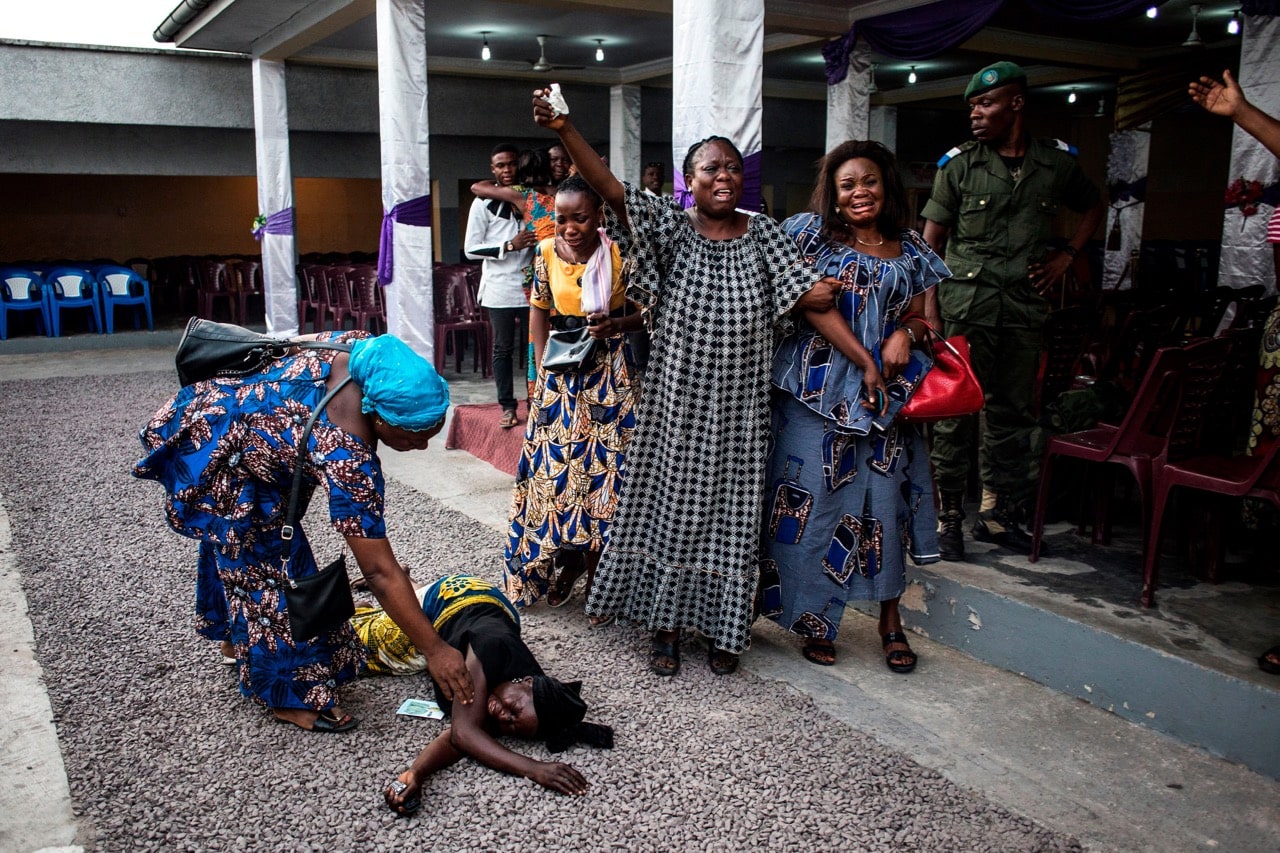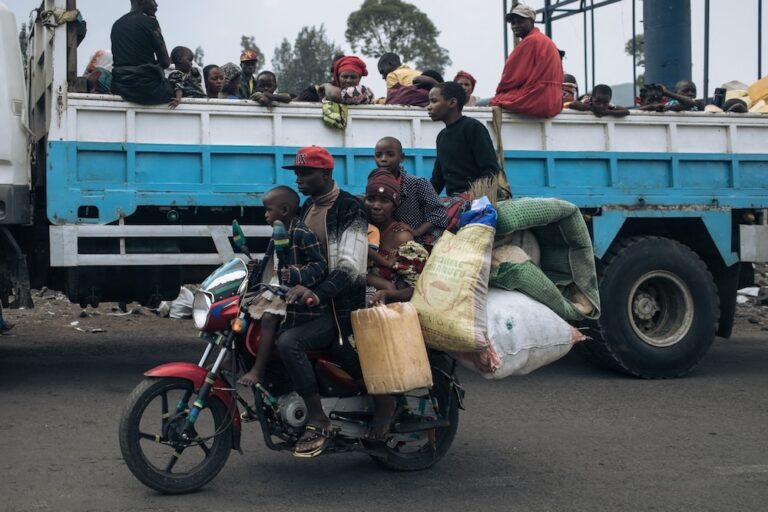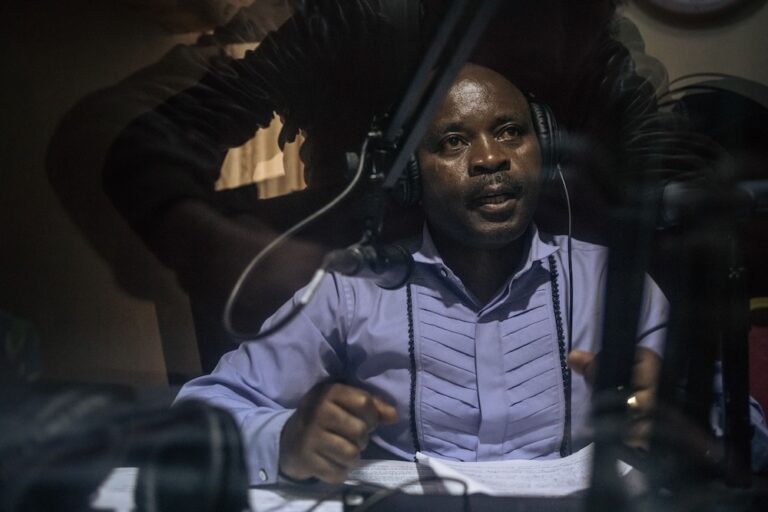The shooting, beating, and arbitrary arrests of peaceful churchgoers by Congolese security forces violated the rights to freedom of worship, expression, and peaceful assembly, Human Rights Watch says.
This statement was originally published on hrw.org on 19 January 2018.
Security forces in the Democratic Republic of Congo used excessive force, including teargas and live ammunition, against peaceful protesters at Catholic churches in the capital, Kinshasa, and other cities on December 31, 2017, Human Rights Watch said today. When confronted by the heavily armed police and soldiers, some protesters, dressed in white, sang hymns or knelt on the ground. At least eight people were killed and dozens injured, including at least 27 with gunshot wounds, but the actual number killed and wounded may be much higher.
The shooting, beating, and arbitrary arrests of peaceful churchgoers by Congolese security forces violated the rights to freedom of worship, expression, and peaceful assembly, Human Rights Watch said. Those responsible for the unlawful use of deadly force should be prosecuted. With more protests planned, the authorities should lift the ban on demonstrations and allow people to worship without interference.
“Congolese security forces hit a new low by firing into church grounds to disrupt peaceful services and processions,” said Ida Sawyer, Central Africa director at Human Rights Watch. “The government should stop banning demonstrations and leave worshipers alone.”
Since the shootings, Catholic Church lay leaders in Congo have called for peaceful marches following Sunday Mass on January 21, 2018, to press Congo’s leaders to respect the Catholic Church-mediated political agreement signed in late 2016. The agreement called for presidential elections by the end of 2017 and measures to ease political tensions. These commitments have largely been ignored, however, as President Joseph Kabila has held on to power through repression and violence.
Since December 31, Human Rights Watch has interviewed 86 people in Congo, including victims and their family members, witnesses, priests and other church officials, hospital and morgue employees, local activists, security force officers, and political leaders.
In early December, the Lay Coordination Committee (CLC), a group of Catholic intellectuals, backed by Catholic priests and bishops in Congo, called for a protest on December 31. They appealed to all Congolese to protest the failure to implement the so-called New Year’s Eve Agreement and “to free the future of Congo.” Priests at parishes across Congo planned peaceful processions that would begin from their churches immediately following Sunday Mass. All the main political opposition leaders, civil society groups, and citizens’ movements supported the call to protest, with many explicitly demanding Kabila’s immediate resignation and a “citizens’ transition” to restore constitutional order and organize credible elections.
In the days leading up to the protests and on December 31, security forces arrested scores of people, including at least six Catholic priests, as well as pro-democracy activists, members of opposition parties, and other peaceful protesters. In an apparent attempt to prevent information about the protests from spreading, the government ordered telecommunications companies to block text messages and internet access across Congo on December 30. Service was only restored three days later.
On the morning of December 31, security forces surrounded at least 134 Catholic parishes in Kinshasa and erected roadblocks across the city, the church reported. Many Kinshasa residents were forced to show their voter registration cards, which serve as identity cards in Congo, to pass the roadblocks and continue to church. Some people, including those wearing or holding visible religious symbols – such as crosses, bibles, rosaries, and palms – were blocked from crossing the roadblocks. Security forces told some that there would be no Mass that day and they should return home.
Despite the heavy intimidation tactics, churches were packed, according to priests and congregants. Worshipers and others attempted to demonstrate following services in the cities and towns of Beni, Bukavu, Butembo, Goma, Idjwi, Kindu, Kamina, Kananga, Kisangani, Lubumbashi, Matadi, and Mbandaka, as well as in the capital. Across the country, the security forces quickly and often violently dispersed the protesters.
In Kinshasa, security forces fired teargas into church buildings in at least three parishes. In numerous other parishes, they fired teargas, rubber bullets, and in some cases live ammunition within the parish grounds, just outside the church buildings.
“At the beginning of the homily, I heard a loud boom from outside as the police fired teargas,” a priest in Kinshasa said. “But despite this, I continued with the service. Then there was a second boom, and a third, and this time the police had fired teargas within the church. It was then impossible to continue, so I had to stop the Mass to allow the worshipers to go outside to breathe.”
Kinshasa’s police spokesperson said on January 2 that five people were killed on December 31, including a policeman, two bandits known as “kulunas,” a so-called “terrorist,” and a member of the Kamuina Nsapu militia, who all reportedly died under circumstances unrelated to the protests.
In addition to eight deaths that could be confirmed, Human Rights Watch received credible reports from security force officers, morgue officials, and others about at least 20 additional people killed in Kinshasa whose bodies were taken by the security forces to unrevealed locations. Some were allegedly thrown in the Congo River. Human Rights Watch is continuing its investigations into these reported deaths.
Congolese authorities should fully permit peaceful demonstrations in accordance with international human rights standards, and ensure that security forces do not use unnecessary or excessive force. Those responsible for the unlawful use of force, arbitrary arrests, and other serious rights violations should be appropriately disciplined or prosecuted. The authorities should stop blocking communication, including by compelling telecommunications companies to limit services.
The UN peacekeeping mission in Congo, MONUSCO, should carry out its mandate to protect the population more actively, including by deploying to areas where people are likely to gather in advance of planned demonstrations to act as a deterrent against abuses.
Congo’s international partners should show there are real consequences for the violent and abusive tactics government officials and security forces are using to maintain Kabila’s grip on power, including through expanded targeted sanctions against those most responsible for the abuses and those providing financial or political support to the repressive tactics. Donors should end all direct support to the Congolese government and security forces until concrete steps are taken to open political space and hold those responsible for serious abuses to account. Funding should be redirected to humanitarian aid and Congolese civil society and human rights groups. Regional leaders should press Kabila to step down and work with other partners to address any concerns about his physical security after he leaves power.
The UN special rapporteur on freedom of religion or belief should conduct a visit to Congo to investigate and publicly report on the violence against priests and worshippers within Catholic parishes around December 31.
“Kabila and his coterie appear ready to use all available means to crush, silence and eliminate any opposition to their efforts to stay in power,” Sawyer said. “Before yet another round of deadly violence and repression, Congo’s international partners should show Kabila that further abuses will not be tolerated.”
Security Forces Surround Churches, Disrupt Services and Processions
Kinshasa has more than 160 Catholic parishes, the vast majority of which were surrounded or disrupted by security forces during or after Sunday Mass on December 31, priests and other church officials said. According to a technical note published by the Nonce Apostolique, the permanent diplomatic representative of the Holy See in Kinshasa, on January 3, security forces surrounded 134 Catholic parishes in Kinshasa; completely blocked access to and prevented celebration of Mass at two; disrupted Mass services at five; entered parish grounds in at least 18; and fired teargas into at least 10. Deaths were reported in at least three parishes, the note said.
A priest in Kinshasa told Human Rights Watch that he was surprised by the number of people who showed up for Mass that day, given that security forces had surrounded his parish:
Generally, we only see this type of crowd during big religious celebrations, but it was a rather ordinary Mass on the 31st. Yet my parish was flooded with worshipers, both inside the church and outside in the courtyard. I was very surprised because the police had already deployed near the parish the day before and they’d set up multiple barriers. I was sure that the faithful would be too afraid to go to Mass the next day. But I see now that the Congolese people are determined.
Another priest in Kinshasa said the police fired teargas and live ammunition at the crowd of worshipers who wanted to start their march after Mass, and then followed those who sought shelter inside the church, firing teargas and raiding the vestry. He said:
When the faithful wanted to start the march, security forces tried to stop them by blocking the road and firing teargas at the crowd. Following the instructions that had been given in advance, the Christians all knelt down and began singing hymns. Security forces responded to this by firing live ammunition, wounding two people. Panic ensued, and some of the worshipers ran back inside the church.
About 10 minutes later, the police broke into the parish and fired at least six rounds of teargas at the children, elderly, and others seeking shelter inside the church. Then they ransacked everything, including the benches, the creche, and they even attempted to set the statue of the Virgin Mary on fire. They went into the vestry and systematically searched everything, apparently looking for money or other valuables.
At another parish in Kinshasa, the priest decided not to organize a march outside the parish grounds, given the heavy deployment of security forces, but to instead hold a procession from the church to a statue of the Virgin Mary. “The worshipers were led by acolytes bearing crosses and other religious symbols as they processed toward the statue,” he said. “When the security forces outside saw this, they immediately fired teargas. A police officer then fired live bullets at those who had already reached the statue, wounding two people.”



